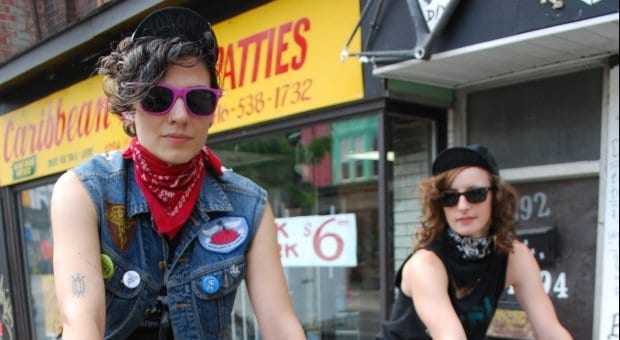Members of Bike Pirates, a community bike shop, will be using their bikes to marshal both the Toronto Dyke March and the Trans March this year.
“I would love to see the dykes on bicycles community come together in more visible and deliberate ways,” says avid cyclist and Dyke March organizer Laura Krahn, which is why she asked for Bike Pirates’ help this year.
In the last few years, bike shops across the country have been dedicating more space to the queer community and women to answer demand for safer places to work on their bikes. The goal is to empower them to ask questions, access tools and repair their own bikes, all while getting a break from the traditionally male-dominated atmosphere of most shops.
“It’s often a sea of men and only a few women – and that can be really intimidating,” says Leanne Kavanaugh, of Our Community Bikes in Vancouver.
In Toronto, Bike Pirates has hosted women and trans Sundays for the last three years, and the Community Bicycle Network has offered a bike mechanics course for women, called Wenches with Wrenches, since 2002.
In Vancouver, the UBC Bike Co-op offers a women and queer night, Our Community Bikes hosts Women on Wheels, and Kickstand runs the Grrls, Queers and Gears program.
In Montreal, the Flat Bike Collective offers a women, trans and queer night, and Right to Move hosts Girls’ Night In.
Bike PIrates volunteer Christy Shapley says people still try to access the space or even get angry when they’re told only self-identified women and trans people can use the shop on Sundays, which only highlights why it’s necessary to continue the program.
But sexism doesn’t exist only in shop settings. Driver hostility toward cyclists is common and often shows itself in homophobic and sexist ways, cyclist Astrid Idlewild says.
“I’ve been called a ‘fucking dyke’ more times than I can count,” she says. “I mean, they’re right, I am a dyke, but they mean to somehow hurt me by calling me the D-word.”
Idlewild gained her strong cycling skills as a bike messenger and always holds her ground on the road, sometimes against extreme aggression. She can cite several occasions when she’s been run off the road, assaulted or injured by motorists. Despite these experiences, she says she’s grateful to be able to ride.
Bicycles have long played an important role in women’s lives. Feminist foremother Susan B Anthony once said, “Let me tell you what I think of bicycling. I think it has done more to emancipate women than anything else in the world.”
Bicycling was once seen as an inappropriate activity for ladies, considered immoral, immodest and a danger to reproduction. According to a Bust magazine report, the physical freedom of cycling led to mental liberation, and therefore political awakening, and challenged gender roles as “wheel women” increasingly chose bloomers over skirts and generally became more independent.
Today, many women still feel empowered by cycling and knowing how to tune up their own bikes.
“It’s incredibly powerful for me to know that my body can get me wherever I need to go,” Emma Woolley says.
Kavanaugh says bike mechanics often lead women to explore other types of mechanics and to begin fixing things around their homes. “I think that we’re not given a lot of avenues to feel comfortable exploring mechanical things,” she says. “It’s an amazing gateway to understanding your own abilities better.”
She says cycling has a special place in queer communities because of the shared values of sustainability, do-it-yourself and skills-sharing.
“Bike culture is generally more accessible financially and gives the power to move to anyone able to use them – which can be very powerful. It puts the power literally in our feet, which speaks to the DIY feel of many queer politics,” Woolley says.
Krahn agrees. “This city is not built for biking, just as our world is not structured for queerness or transness,” she says. “Queerness can allow freedom, an access to the margins of what we are told is possible, and I view biking in much the same way. Both cycling and queerness can enable following rules that make sense to us individually or as a community.”

 Why you can trust Xtra
Why you can trust Xtra


